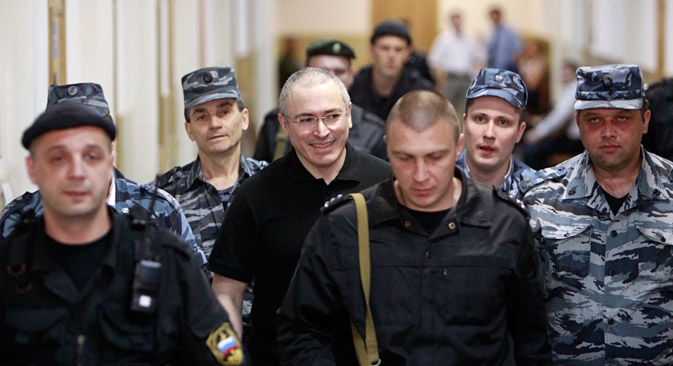
In late 2010, a court sentenced Khodorkovsky and Lebedev to 14 years in prison each on charges of stealing 200,000,000 tons of oil and money laundering. Source: Reuters
Mikhail Khodorkovsky has been released from his penitentiary. Russian President Vladimir Putin has signed a decree pardoning jailed former Yukos head on Friday, the Kremlin press service reported. "In accordance with humanitarian principles," the president's decree "pardons convict Mikhail Borisovich Khodorkovsky, born in 1963, a Muscovite, relieving him of the obligation to further serve his prison sentence," according to the document.
Russian President Vladimir Putin announced on Thursday that he intends to sign a petition to pardon former Yukos head Mikhail Khodorkovsky.
"He's already spent more than 10 years in prison, that's a serious term. I believe that the decision needs to be made (to pardon)," Putin said after a four-hour press conference in Moscow.
"As for Khodorkovsky, I have already talked about this. Mikhail Khodorkovsky, in accordance with the law, had to write up a particular document. He did not do so, but now he recently did write up this document and requested that I give him a pardon.”
Putin said the well-known prisoner cited humanitarian circumstances in his request for a pardon. "His mother is sick, and I believe that the decision can be made, a decree pardoning him will be signed very soon.In the near future his request will be satisfied," Putin said.
Former Yukos CEO, who was pardoned by Russian President Vladimir Putin on Friday, has been released from his penitentiary, the country's Federal Penitentiary Institutions Service said in a press release.
The surprise announcement came after Putin gave an annual press conference in Moscow, which lasted for more than four hours.
The pardon came on the same day the Russian parliament passed an amnesty bill that will grant an early release to other high-profile prisoners, including the jailed members of Pussy Riot and demonstrators arrested in 2012 during anti-Kremlin protests. Thirty members of Greenpeace will also be pardon, most likely before their trial starts.
However, Khodorkovsky's defense team insisted late Thursday that he did not request amnesty from the Russian president, Reuters reported. "That did not happen and could not have happened," said Vadim Klyuvgant, one of Khodorkovsky's lawyers.
The press center of Khodorkovsky and Lebedev declined to comment on what the president said.
Khodorkovsky and his business partner Platon Lebedev were each sentenced by the Meshchansky district court to nine years imprisonment on May 31, 2005.
They were found guilty of fraud, embezzlement of funds from the state, stealing large amounts of valuable raw materials, a few non-enforced decisions of arbitrage courts, and evasion of individual and corporate taxes. Their sentence was later reduced to eight years.
Critics claimed the case against the Yukos directors was a result of Khodorkovsky’s increasing active involvement in politics that did not support the Kremlin.
In late 2010, a court again sentenced Khodorkovsky and Lebedev to 14 years in prison each on charges of stealing 200,000,000 tons of oil and money laundering, taking into account the punishment imposed by the Meshchansky court in Moscow in the May 2005 case. Then, the sentence was reduced by one year. The Presidium of the Moscow City Court reduced the sentence from 13 to 11 years on December 20 of last year.
The businessman tried to show that all charges against him were politically motivated, but in 2011 the European Court of Human Rights did not uncover political motivation in the Yukos case, although they found a number of procedural irregularities.
During a four-hour long press conference in Moscow, the Russian president said he did not see value in a third Yukos case, an idea that has surfaced in rumors recently.
"Regarding a third case, I do not want to go into details, but, frankly, as a person who is watching from the sidelines without delving in, I do not see much value in this," said Putin."I do not understand at all where the case is. I heard people are talking about it, but so far I don't see any threats there to anyone.”
Chris Weafer, Alfa Bank’s chief strategist, told Russia Direct that the pardon most likely stems from the need to improve the image and investment attractiveness of the country before the upcoming Olympic Games.
"Together with the amnesty of the Greenpeace activists, the news of Khodorkovsky would be a positive argument for cooperating with Russia," he said.
But Igor Bunin, president of the Center for Political Technologies, disagrees. He said he thinks the president already hinted several times to Khodorkovsky that he would pardon him, if he so requested.
"This pardon is due solely to writing a statement. If he had not sent a petition, then the need to improve the image and investment attractiveness of Russia would not have helped him," Bunin said.
Bunin added that releasing the former head of Yukos from prison will not affect Russia's relations with the West very much, although after the president's announcement, shares of Russian companies on the stock exchange rose by 1.5 percent.
Sergei Markov, the director of the Institute of Political Studies and a member of the Civic Chamber, said he is confident foreigners understand that Khodorkovsky did commit a crime.
“I think anti-Russian actions abroad will receive less funding now,” Markov said. ‘It seems to me that this pardon is a response to a promise by Khodorkovsky supporters not to finance attacks on Russia in the international arena.”
Khordorkovsky no longer carries political weight, so there will not be significant changes to internal policy, Markov said.
"Perhaps the only change will be that the radical opposition will have one less reason to criticize the government," says Markov.
“Khodorkovsky is a talented person and he should not be sewing mittens, but working in business. Most likely in 10 years will see him at the head of a large company."
All rights reserved by Rossiyskaya Gazeta.
Subscribe
to our newsletter!
Get the week's best stories straight to your inbox